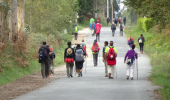Turga
Camino tortuga
- Time of past OR future Camino
 . . . . . . . . .
. . . . . . . . .
Just a little thought for your amusement (?) - (only slightly Camino relevant).
One of my favorite books is “Lykkelige Kristoffer” (Fortunate Kristoffer) by Martin A. Hansen. It is one of those books, that you can read repeatedly and each time discover new layers and interpretations. In short, it is about a boy who grows up in the dark and damp forests of southern Sweden in the mid-1500s (shortly after the Danish rule in Sweden). He is deeply religious and at a very early age, he decides that he wants to dedicate his life to defend his beliefs (this is around the time of The Reformation), to be a guardian of the poor and weak and fight for justice (a faint dream for common people then). He figures that to become a ‘knight’ he needs the proper equipment including a horse, but, as he is very poor, he sees no way of getting a horse. He discusses this problem with his only friend Brother Martin, a young, former monk and apprentice ‘medicamentarius’:
“But, Brother Martin, how can I embark on my mission as a knight if I do not have a horse?” Brother Martin then tries to encourage and console his friend and responds: “Worry not, Kristoffer; these days the feet have once again come to honor and dignity. On those humble pendants, many a rascal rides out in pursuit of reputation in the horrors and stupidity of war.”
When I think about the Camino, this dialog often pops up in my mind because (ignoring the reference to war), on the Camino, ‘those humble pendants’ play a vital role and ‘come to honor and dignity’.
Ave the feet!
(Just to give a little more context, Kristoffer does manage to get a horse, rides out on his mission and dies by the sword less than a year later with peace and calm in his heart knowing that he has done right).
One of my favorite books is “Lykkelige Kristoffer” (Fortunate Kristoffer) by Martin A. Hansen. It is one of those books, that you can read repeatedly and each time discover new layers and interpretations. In short, it is about a boy who grows up in the dark and damp forests of southern Sweden in the mid-1500s (shortly after the Danish rule in Sweden). He is deeply religious and at a very early age, he decides that he wants to dedicate his life to defend his beliefs (this is around the time of The Reformation), to be a guardian of the poor and weak and fight for justice (a faint dream for common people then). He figures that to become a ‘knight’ he needs the proper equipment including a horse, but, as he is very poor, he sees no way of getting a horse. He discusses this problem with his only friend Brother Martin, a young, former monk and apprentice ‘medicamentarius’:
“But, Brother Martin, how can I embark on my mission as a knight if I do not have a horse?” Brother Martin then tries to encourage and console his friend and responds: “Worry not, Kristoffer; these days the feet have once again come to honor and dignity. On those humble pendants, many a rascal rides out in pursuit of reputation in the horrors and stupidity of war.”
When I think about the Camino, this dialog often pops up in my mind because (ignoring the reference to war), on the Camino, ‘those humble pendants’ play a vital role and ‘come to honor and dignity’.
Ave the feet!
(Just to give a little more context, Kristoffer does manage to get a horse, rides out on his mission and dies by the sword less than a year later with peace and calm in his heart knowing that he has done right).












